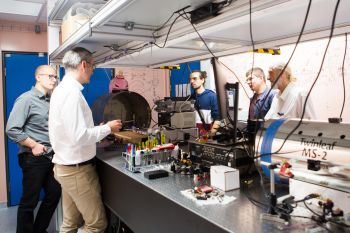SPQR and CDO2 win Faraday Industrial Fellowship to develop quantum sensors for electric vehicle batteries
By: Rebecca Bond
Last updated: Monday, 10 August 2020

Dr Chris Abel and Dr Mark Bason show visitors around the quantum laboratories
The Sussex Programme for Quantum Research (SPQR) at the University of Sussex has once again teamed up with commercial partner CD02 and are thrilled to have won a prestigious Industry Fellowship from the Faraday Institute. The two partners have a longstanding collaboration having worked together now since the beginning of 2018 just after SPQR was established.
Together they have made discoveries with funding awarded by the government’s Faraday Battery Challenge, where they assess techniques for measuring current flow through electric vehicle batteries, with the aim of extending battery life and enhancing performance.
This latest award ensures CDO2 can have an academic embedded in their team to validate the sensors that they have developed together to help with their commercialisation activity of battery research and test equipment. SPQR’s research fellow, Dr Christopher Abel is to be seconded and work with CDO2 on a six month placement.
Professor Peter Krüger, principal investigator of the project has said “With this new tranche of funding we are in a position to further develop our quantum sensors to check the health and state of charge of electric vehicle batteries. Ultimately the aim is for this research to support a more sustainable and safer future for electric vehicles as part of the government’s initiative to ban the sales of new petrol and diesel cars by 2035.”
“Working with our commercial partner CDO2 brings a wide range of mutual benefits to bring the product to market.”
Gary Kendall, founder and CEO of CDO2, will be Dr Abel’s industrial supervisor. He says “We are delighted to welcome Chris onto our team for the next half year. Working with SPQR has brought us so many opportunities and we are excited to continue our work on this important aspect of future technology alongside them.”
Ian Ellerington, Head of Technology Transfer at the Faraday Institution. “This is the Faraday Institution’s latest initiative to deliver application-inspired battery research as part of our mission to accelerate breakthroughs in energy storage technologies. “
